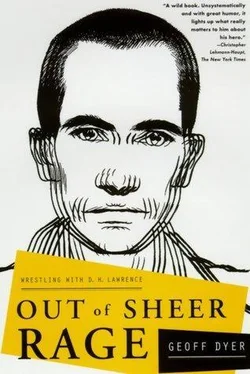Still, drinking these half grandi and lavishing hospitality appeared to be having a calming effect on Ciccio. He had not phoned Renata for twenty minutes — but what I had taken to be calm actually turned out to be the lull before the telephonic storm. A waiter arrived with a cordless phone: there was a call for Ciccio: Renata. They spoke for ten minutes. Then Laura had a chat — then, although I had never met Renata (who spoke no English), it was my turn. After that we were ready for another round so I handed her back to Ciccio. While he was talking Laura said she would love to open a hotel.
‘Would you?’
‘Well, not a hotel: a pensione . I’d take such pride keeping it clean,’ she said. By now the phone had achieved a position of such unquestioned predominance over our lives in Sicily that by simple virtue of the fact that it had been conducted face to face, in person, this exchange had a quaint, not to say archaic air about it.
Eventually Ciccio got off the phone and gestured for the bill. I offered to pay — English-style, without really expecting to — but Ciccio was already out of his seat, on his way to settle up. On the way out he introduced me to the manager of the restaurant, a guy with curly hair, a little younger than me, smoking a cigar and wearing a gingham jacket which may or may not have been — it was a question of style — too big for him.
‘Ciccio said you were writing an article about the restaurant,’ he said.
‘Well, about Taormina, generally,’ I said, catching on that Ciccio had settled the bill Sicilian-style, by saying I was writing an article for the British Airways in-flight magazine, the kind of piece that would guarantee a queue of customers seven nights a week.
‘This is nice restaurant, we have to have something like this, casual like this, but I have another restaurant, really good restaurant. A high-class restaurant where everything is special. You should go there. Is a special place. I think you would like.’
‘Yes I’m sure I would,’ I said, thinking that if I had an air mile for every time someone had told me I would like something that I felt pretty certain I would hate — for exactly the reason they claimed I would like it — I could have circumnavigated the globe by now. I took a card for the restaurant and a flyer for the disco that he also ran. Before we left, I promised, we would try out both the restaurant and the disco.
Once we were out of the restaurant Ciccio was able to relax totally, in the sense that he was able to head straight to a payphone and call Renata. When he was through talking to her he drove us to Furci where we would be staying. I asked why a red light on the dashboard was flashing.
‘Is to tell me I am not wearing seat belt,’ Ciccio said. An EU ruling meant that all new cars were fitted with this warning device. A stupid and dangerous idea, he thought. The flashing distracted and could make you crash. But there was someone he knew who was going to disconnect the wires so that he could ride in comfort without his seat belt and without this flashing light. Wouldn’t it be easier just to wear the seat belt? I asked, but that was beside the point. The point was that there was a way around this edict. Italians delight in exercising their ingenuity for trivial ends. To use ingenuity for some loftier purpose is somehow to diminish it. The more pointless the end the more vividly the means of achieving it is displayed. The further south you travel, the more extreme this tendency becomes. The ingenuity of the Romans, for example, is as nothing compared to that of the Neapolitans. Ciccio even knew someone who sold T-shirts with a diagonal black band printed across the chest so that the police would be deceived into thinking you were wearing your seat belt.
Furci, we saw the next morning, was a miserable little town with reinforced concrete rods sprouting from unfinished buildings that, for reasons of tax, had no chance of being completed. Ciccio had got up early and so we waited for a bus to take us back into Taormina, passing the time by watching a group of boys rough-housing. Boys in Sicily spend all their time larking around, rough-housing, teasing each other. When they grow up and become men nothing changes — it’s just that the pace of the larking around is scaled down until, by the time they are in their sixties, they do it sitting down, with hardly a word being spoken. Take this guy in a fat yellow T-shirt, waddling past on his bike. At thirteen he had been the fat boy who everyone teased; now, at thirty, he was a grown-up fat boy. His friends teased him and he cycled off, sulking, but then, in the forgiving way of fat boys who cannot bear to be on their own, he came back, ready for more.
On the corner of a street, in the shade, a woman was selling fish, calling out to passing motorists; an old man cycled past, selling oregano; a man shaving in a second-floor window conducted a prolonged conversation with a friend in the street: vivid instances of why — quite apart from the inherent musicality of the language — so many of the great opera singers have been Italian. Opera begins in the market where, over and above the simple demands of competition, of being able to attract customers’ attention, stall holders have to convey the colour and taste of fruit in their voices. The man selling oregano, for example: he called out and the air was fragrant with oregano. His job was not to sell oregano but to fill the air with the sound of its scent. And while Italians are happy to be in close proximity to each other as we were on the train, they enjoy conversing from a great distance, or calling down the street to each other. The popularity of cellular phones is simply the technological manifestation of this inherited cultural trait.
As soon as we arrived in Taormina we began asking for Lawrence’s house, the Villa Fontana Vecchia. No one knew of a Villa Fontana Vecchia but several people knew of a Via Fontana Vecchia. We headed that way while Laura, now that we were no longer bound by the code of silence, stopped almost everyone to ask directions. It was as though we were not seeking guidance so much as canvassing local opinion as to the whereabouts of the Villa Fontana Vecchia. The results of such a survey confirmed our initial impression of Sicilians, for the typical response was to claim that there was no such place and then, once we looked suitably crestfallen, to direct us towards it. We wound our way there and began looking for the exact house. We saw a man reading La Sicilia in the distinctive way that Italians have of reading newspapers, especially the sports pages: he was absorbed in his reading, giving himself totally to the experience but with an expression of furrowed doubt etched into his face. Watching him, it seemed certain that reading the papers each morning had become a substitute for prayer. Reluctant to disturb him in his devotions we spoke to a woman with a limp who thought it might be the first house on the corner. A lovely old place, it turned out, which happened to be for rent. I decided then and there that I would rent it for six months in order to write my book because it was such a clear example of serendipity that the house Lawrence had lived in should be available to rent. The problem was that there was no way of confirming whether or not it was the right house. We asked another woman with an even more pronounced limp (they are great limpers, the Sicilians) who shook her head and said it was definitely not the house of Lawrence, it was her son-in-law’s house.
We walked on and the Via Fontana Vecchia turned into Via David Herbert Lawrence. Ah! We were on the right track. It seemed a shame, though, that it wasn’t called Via Lorenzo which would have fitted in better with the other street names. Laura took my photo — with a newly bought disposable camera: having lugged the Nikon to Sicily, she had left it back in vile Furci — beneath the sign because that was the only way we could think of commemorating this discovery. We asked a man with a walking stick if he knew the house. He replied eagerly, as expected: men with walking sticks are always pleased to give directions: the act of raising the stick and pointing imparts to them something of the character of a prophet. Lawrence’s house was the big place, quite a way off, on the right, the place with mustard-coloured walls. We plodded along the road that clung to the hillside. The sun lurched in and out of clouds, bougainvillaea dulled and burst into purple flame. The road had curled in such a way that we were now behind the houses pointed out by the prophet, and it was impossible to tell which one he had singled out.
Читать дальше












